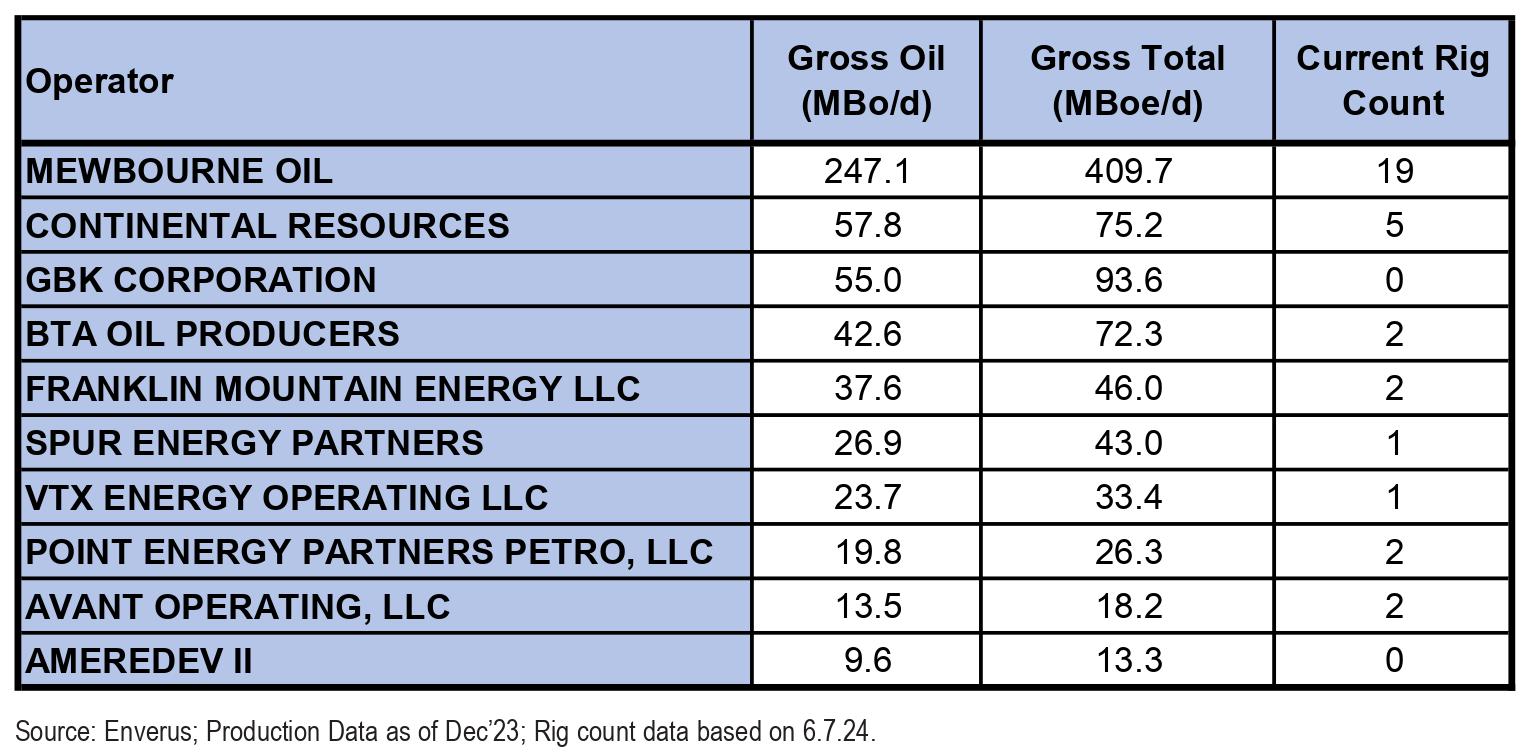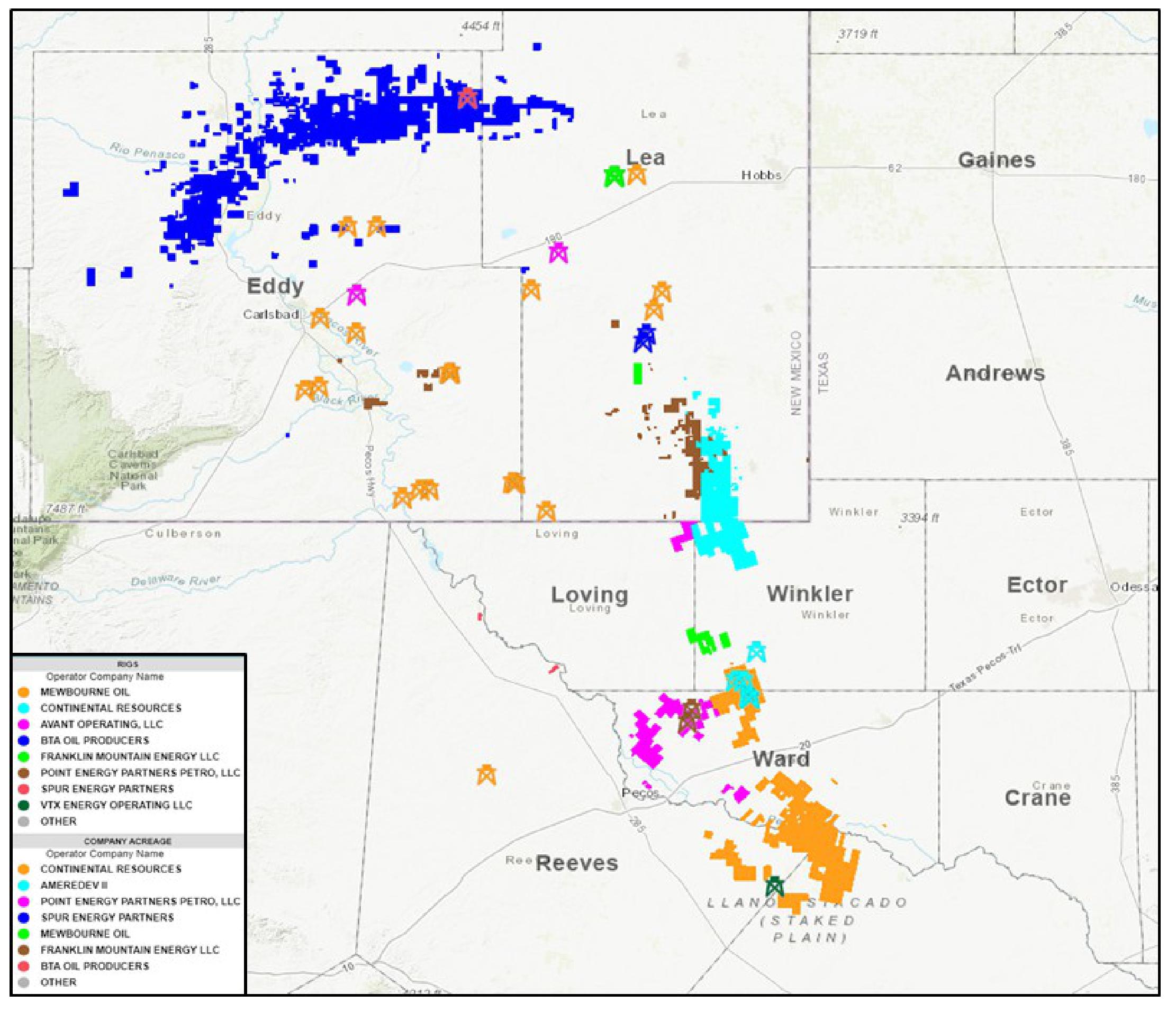
Point Energy appeared at No. 8 in J.P. Morgan Securities’ recent ranking of the Top 10 privately held Delaware Basin producers, using December 2023 production data. (Source: Shutterstock)
Private equity-backed Point Energy Partners has tripled its Delaware Basin production to 14,996 bbl/d from 5,615 bbl/d a year earlier, according to Texas Railroad Commission (RRC) data.
Including associated gas, the Fort Worth, Texas-based producer’s March output was some 20,123 boe/d on a 6:1 basis. March production is the latest data released by the RRC.
Most of the growth has been from new wells but includes a few bolt-on acquisitions, John Sabia, Point Energy’s CFO and a senior partner, told Hart Energy.
Production reached as much as 20,803 bbl/d and 27,487 boe/d in November, primarily from Ward County, but also from Winkler County, according to the RRC files.
Contributing to the surge between April 2023 and March 2023 is the operator’s Dire Wolf unit in Ward County with four new horizontals coming online in October and November, producing a combined 323,000 bbl through March, all from Wolfcamp.
New Megalodon unit
Another Point Energy well package, the 15-well Megalodon unit, has been online since March, Sabia told Hart Energy.
The unit is in northern Ward near its intersection with Loving and Winkler counties, according to the RRC.
Sabia said that with Megalodon online, “currently we are producing approximately 48,000 boe/d gross and approximately 37,000 boe/d net.”
Production is expected to grow further later this summer, he added, as it completes its 12-well Cave Bear unit, which is also in Ward and near the Megalodon.
Point Energy has two rigs drilling currently, both in Ward.
Formed in 2017, the operator is backed by Fort Worth-based Vortus Investment Advisors, which is also invested in Crimson Exploration, Stateline Operating, Triple Crown Resources, Canyon Creek Energy and Nickel Road Operating.
Its wells include ones purchased beginning in 2018 from Vanguard Operating, Callon Petroleum, Centennial Resource Production and other operators.
Point Energy and Ameredev
Point Energy appeared at No. 8 in J.P. Morgan Securities’ recent ranking of the Top 10 privately held Delaware Basin producers, using December 2023 production data.
Its year-end exit rate was 19,827 bbl/d and 26,292 boe/d.
Another privately-held Delaware producer, Ameredev II, ranked 10th however, with 13,300 boe/d in December, according to the ranking based on Enverus data.
“A significant portion of our production was curtailed [in December] due to downstream takeaway issues from mid-November to early April,” Parker Reese, Ameredev II president and CEO, told Hart Energy.
“So the production does increase from year-end 2023 to May, but it is low-decline PDP [proved developed producing] brought back online, not high-decline production from new wells turned in line.”
Matador Resources is currently in a deal to buy EnCap Investments-backed Ameredev for $1.9 billion cash. Matador expects Ameredev’s third-quarter production to be approximately 25,500 boe/d, the company reported in its June 12 announcement of the deal.
Ameredev’s mostly contiguous 33,500 net acres are in northern Loving County, Texas, and in southern Lea County, New Mexico.

Loving County on hold
The Ameredev position in northern Loving County is adjacent to Point Energy’s lease on 4,000 gross contiguous acres, but the producer is not drilling due to its involvement in a dispute with Matador.
In the case, the Texas Supreme Court ruled 9-0 in 2022 that Matador had lost its lease on the acres on May 21, 2017, when miscalculating the expiration date as June 19 under the continuous-drilling clause.
Matador had claimed force majeure, reporting the rig it planned to use had encountered problems at another site and could not be used in time. The court ruled, however, that the problem resulted in a 30-hour delay and that the rig was sent to drill two wells on another lease.
Matador had calculated a new well needed to be spud by June 19, which was six months after release of the last drilling rig on the lease. Instead, the lease required a new well be spud within six months—May 21—of the last well’s spud date, the court ruled.
Sabia told Hart Energy, “All of our acreage in Loving has been tied up in litigation with Matador for the past seven years.”
While the Supreme Court ruled in Point Energy’s favor, he said, “the case was partially remanded to clean up some of the smaller issues not reached by the [appeals] court, which were dependent on the force majeure question.
“We anticipate a favorable ruling on all remaining issues so that we can finally put this matter to bed.”
Formerly SandRidge, Devon, Oxy
Point Energy’s CEO is Bryan Moody, who was previously with Eclipse Resources, Exco Resources and SandRidge Energy.
Sabia was with Holland Services, Vine Royalty and Goldman Sachs.
Point Energy’s operations and technical team members include Joel Acosta, senior vice president of operations, who was with SandRidge, RKI Exploration & Production and WPX Energy; and Jay Brenner, also senior vice president of operations, who worked with RKI, WPX and Devon Energy.
Cameron Boyd, vice president of operations, was with Petrofac Facilities Management. Will Arthur, vice president, reservoir engineering, worked in ConocoPhillips’ Permian Basin unit.
Chris Savage, vice president, geology, was in Anadarko Petroleum’s Delaware Basin unit. Estaban Velasquez, vice president of field operations, was in the Permian for Occidental Petroleum, Trey Resources and Pilot Water Solutions.

Recommended Reading
‘Too Many’ Players: Oilfield Services Feel Permian M&A Crunch—Dallas Fed
2024-06-27 - After a historic run of E&P consolidation, oilfield services and equipment providers in the Permian are competing to woo a dwindling number of upstream customers, according to the second-quarter Dallas Fed Energy Survey.
Gas Producers Increasingly Dominating in New Shale Top Operators List
2024-06-26 - As more private oil producers are gobbled up by giant publics, the gas players are moving up the ranks of the top operators, according to a compiled list by Enverus in an exclusive partnership with Oil and Gas Investor.
Private E&Ps Pursue Dollars Amid Change
2024-06-25 - Producers contend with roiled capital markets as consolidation alters the strategic landscape.
Surge of Longer Lateral Drilling to Enhance Reservoir Recovery
2024-06-25 - With energy demand growing, operators look to supply hydrocarbons by drilling longer wells.
Aethon Brings on Fourth Monster Haynesville Wildcat in North Houston
2024-06-21 - Aethon Energy’s latest well made 2.6 Bcf in its first 3.5 months online. The new play’s first 15 wells to date have made 100.3 Bcf, averaging 21 MMcf/d over a combined 159 months.






